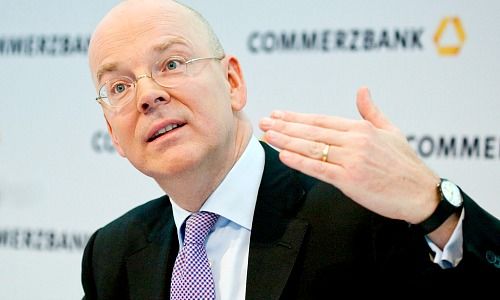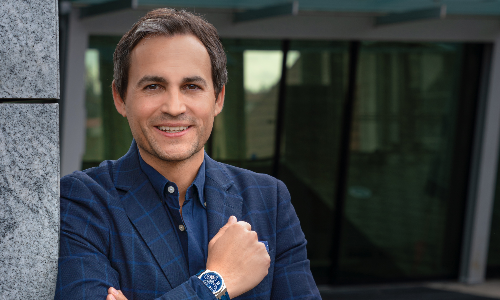Today, Martin Blessing is taking over at the helm of UBS Switzerland. The former McKinsey adviser and head of Commerzbank is met with a considerable degree of disquiet – here are the answers to the most urgent questions for the German manager.
1. What will Martin Blessing be doing first?
Performance is what will be required on his first day at the office – as top manager of main sponsor UBS, Martin Blessing will be at Zurich's Letzigrund stadium watching «Weltklasse Zurich», the first top class athletics event after the Rio Olympics.
Blessing will then take off on a tour of the country, with a particular emphasis on the French-speaking region, a strongly performing region, sources at UBS said. The ten Swiss regions with some 300 branches have proven to be a solid backbone of UBS Switzerland. Blessing therefore has to gain the trust of the employees working far from the center, before he can properly steer from Zurich.
2. What does the top brass really expect of him?
The 52-year-old soon after his first speeches will have to follow up with new concepts. He is expected to leave no stone unturned.
Answers are required in particular in respect to the pricing of consultancy services and products. The negative rates are a further hot topic, because a new way to handle the issue will be required the longer they remain in place. Costs obviously also are an urgent issue: the costs savings in global wealth management and the relocation of back offices to countries with cheaper labor, such as Poland, also affects UBS Switzerland.
3. Is Blessing destined to succeed Ermotti?
UBS hired Blessing with a view to install him as the group CEO once Sergio Ermotti departs, insiders say. In an environment clouded by uncertainty, the succession question quickly becomes a key issue for a bank of the size of UBS. The turbulence at cross-town rival Credit Suisse is the perfect example for this mechanism.
Ermotti is a proclaimed Blessing supporter, people at UBS say. He knows the German manager from his stint at Unicredit and dubbed him a «consummate banker». Time will tell whether the two will be able to form a dream team. But to put a potential future CEO in charge of the important Swiss business is a shrewd move by any measure.
4. Is Blessing the opposite of Lukas Gaehwiler, his predecessor?
Lukas Gaehwiler was the choice of Oswald Gruebel in 2010, charged to put the Swiss business back on track after the Swiss government had to step in to save the bank.
In the first six months of 2016, UBS Switzerland contributed 800 million Swiss francs to the company's pretax profit – amid difficult times. Gaehwiler delivered on his «Agenda 2011». Even foreign investors are holding on to their UBS shares because of the bank's strong domestic performance.
Blessing will be well-advised not to change the business strategy too abruptly. «Agenda 2017», if there is one to be, ought to put more weigh on maximizing profit from what has been achieved. Pretty much what Juerg Zeltner is doing at wealth management, UBS' core unit.
A man with a smart appearance, Blessing will want to make UBS Switzerland shine a little more. The unit has been bit of a wallflower within the group despite the importance of the business.
5. Why hasn't he joined years ago?
In fact, Blessing wanted to join UBS years ago. But the German government, as a minority owner of Commerzbank, vetoed the move. Blessing was forced to stay and put right what had gone wrong during the financial and euro crises.
6. Why is a German the right man for the Swiss No. 1 bank?
The appointment of Blessing, a manager from the outside and a foreigner at that, undoubtedly caused a stir. The fact that the man had studied in St. Gallen and will live in Zurich didn't entirely allay concerns.
But Blessing has learned banking from scratch and he has ample experience as a manager, both in retail and corporate banking, key businesses of UBS Switzerland.
7. How convincing is Blessing's vista?
As the head of Commerzbank, Blessing had no choice but turn himself into an emergency manager. Shortly after taking over in 2008, his bank acquired Dresdner Bank – a transaction organized by his predecessor still. It turned out to be fateful, because the toxic securities on Dresdner's accounts as well as bad loans at Commerzbank unit Eurohypo pushed the bank to the brink.
The government was forced to step in and save the second-biggest German institute with an injection of 18 billion euros. Blessing took the bank back to profitability, resorting to capital increases and restructuring plans, and didn't shy away from shedding thousands of jobs.
Still, with a stress-test passed with less than distinction and rumors about a merger with Deutsche Bank, the mission doesn't look properly accomplished. Indeed, the government remains invested in Commerzbank, not least because the stock is worth 90 percent less than it was before it started collapsing.
Industry sources nevertheless agree that Blessing's strategy kept the bank from going under. The fact that the bank's employees didn't revolt even in face of massive cuts shows how gifted the manager is in convincing his charges of unpopular measures.
8. Just how cuddly is he?
Deutsche Bank always took pride in being a tough bank, a company where performance was generating profit. Commerzbank by contrast was described as an institute where the atmosphere was cuddly. The CEO was very much in line with this image, carrying a Swatch instead of the ubiquitous Rolex, jogging instead of golfing, eating a sausage with the clerks during his breaks. Those attributes were his biggest weakness, concluded Swiss business paper «Handelszeitung» recently – presumably in the absence of something rather more tangibly negative.
9. In for a stiffer breeze?
Blessing is neither kind nor nice. That's what the bankers say who had to report to him. Auditions at the boss caused them anxiety, the sources claim. Why? Because he will continue probing until he has made sure that both his subordinate and he himself understood what the deal is all about. Occasionally, managers were left in pieces after Blessing's inquisition.
The management of Commerzbank is testimony to Blessing's ability to shape – no Dresdner manager is left for instance.
10. Blessing-Effect for Swiss fintech industry?
Blessing is reputedly working very long hours and is always online. His mostly brief SMS are legendary – and underline how digital a banker he is.
Commerzbank is the leading fintech bank of Germany. Based on the Comdirect unit, Commerzbank in Poland launch mBank, rising to No. 4 in the country under the guidance of Blessing. In 2014, the German bank started its own fintech laboratory, the Main Incubator in Frankfurt.
UBS sources say that Blessing already visited the responsible people for UBS' digital banking in Switzerland. It is most likely that payment and advisory solutions projects will get an additional boost under his guidance.
There's no waiting in the wings: several UBS multi-channel-experts have visited mBank in Poland. An acceleration of the digital banking at the Swiss No. 1 will not go unnoticed within the fintech industry of Switzerland.




















